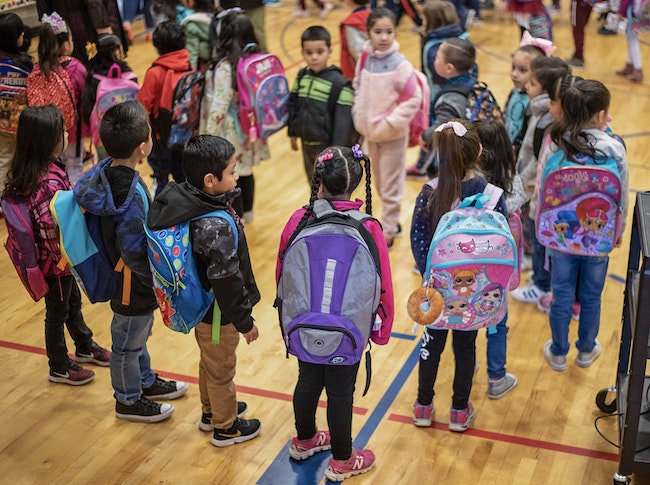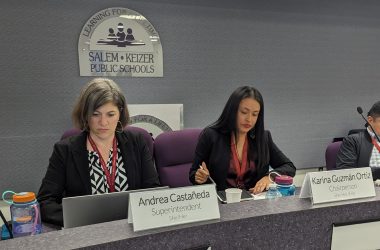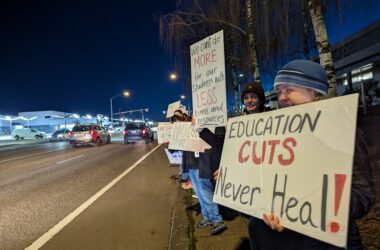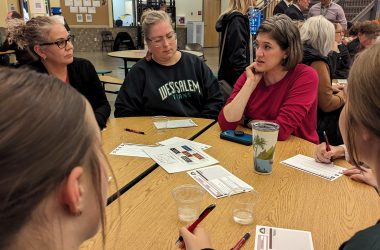 Hallman students gather during the school’s morning assembly. (Fred Joe/Special to Salem Reporter)
Hallman students gather during the school’s morning assembly. (Fred Joe/Special to Salem Reporter)
NOTE: Salem Reporter is providing free access to its content related to the coronavirus as a community service. Subscriptions help support this.
Correction: This story was updated to correct the current end date of the event ban and the proms affected as a result. The district initially provided a later end date for the event ban, then revised it to April 8 after clarification from the Governor’s office.
Local schools are canceling school dances, field trips and assemblies through at least April 8 and barring spectators from school sports, band concerts and other performances to stop the spread of COVID-19.
The changes come as Gov. Kate Brown announced late Wednesday Oregon would ban most gatherings of more than 250 people to prevent transmission of the novel coronavirus.
Large events at Chemeketa Community College have also been canceled, including a state robotics tournament that had been scheduled for the weekend, spokeswoman Marie Hullet said. Also canceled are the music department’s spring recital and a planned job fair, she said.
The college is otherwise continuing classes as normal, she said. A campus task force is meeting daily to assess the changing situation, and Chemeketa is prepared to move all classes online if needed.
Willamette University President Steve Thorsett said Thursday the college would move all classes online to encourage social distancing, and cancel major events including an annual powwow that had been scheduled for Saturday.
Salem-Keizer district administrators on Thursday emailed school employees a detailed list of how the announcement would impact planned events and after-school activities.
The instructions allow most after school clubs and programs to continue events but without spectators, and academic programs like SAT testing and Saturday school to go on as planned.
Parent-teacher conferences won’t be done face-to-face and schools are working to set up phone or video conference options instead.
Sports can continue, but spectators won’t be admitted. The district is clarifying with the Oregon School Activities Association whether the ban should apply to outdoor spring sports, where admission is not typically monitored, district spokeswoman Lillian Govus said. For now, spring sports are included in the spectator ban, she said.
Concerts and performances can go on without an audience by videotaping or livestream, but should otherwise be canceled or rescheduled.
Field trips, out-of-state travel by employees or students, Outdoor School and school dances within the 30-day window will also be canceled. Parent club and booster club meetings have also been canceled.
Among the events now scrubbed are the prom at both North Salem and McNary high schools. Govus said those schools may reschedule the dance. Other high school proms are scheduled after April 11 but could be affected if event cancelations are extended.
A planned Whiteaker Middle School trip to Disneyland over spring break won’t go on – the park has closed, and out-of-state travel for students and employees is canceled.
Honor roll students at Straub Middle School were to be honored at a Thursday night dessert, but that event has also shut down.
The district is considering whether to continue renting schools out for private functions.
Officials at the Oregon Health Authority and the Oregon Department of Education continue to recommend against closing schools, a step some other states have taken.
Washington Governor Jay Inslee on Thursday ordered Seattle-area schools to close through April 24. That covers every public and private school in a three-county area.
Oregon has far fewer presumptive cases of the illness than Washington, in part because only about 300 people statewide have been tested here.
Dr. Richard Leman, public health physician at Oregon Health Authority, said in an interview with Salem Reporter the evidence “is not clear” that closing schools to prevent COVID-19 from spreading will work.
“I’m just not sure the evidence shows closure of schools is going to be effective, sufficiently effective in slowing spread to warrant the disruption it causes,” Leman said.
In addition to education, that disruption includes students who rely on school meals going without food and parents, including those who work in healthcare, having to stay home from work to care for children.
Leman said health officials reached their conclusion about Oregon schools from what they’ve observed as COVID-19 has spread around the world.
Children rarely get sick from the disease and tend to have mild illnesses when they do, and the disease is mostly spread through close contact with someone who’s showing symptoms, like coughing.
“We are focusing on trying to read people the Riot Act that, if indeed anybody is ill they not go to school. Students should not go to school if they’re sick. Teachers should not go to school if they’re sick. Other staff should not go to school if they’re sick,” he said.
He acknowledged children may spread the illness between adults without showing symptoms themselves and said there “may be some risk of spread” from someone infected with the virus but not showing symptoms.
“We do not know how to quantify that, but it appears if we can keep people who are ill out of schools out if workplaces, away from large gatherings that will be very effective,” he said.
The Health Authority is also advising increased handwashing in schools and regular disinfecting of surfaces, precautions Salem-Keizer schools are taking.
Schools haven’t modified schedules or classroom configurations to increase the distance between students, Govus said, but recess and lunch schedules are already staggered at most schools.
Some schools are out of hand sanitizer and the district’s supplier isn’t filling orders for more, Govus said, but supplies of disinfectant wipes, soap and other cleaning supplies are well-stocked. Students can also bring unscented hand sanitizer from home.
School employees have reached out to the 808 Salem-Keizer students considered “medically vulnerable,” meaning they have an underlying health condition that could make them susceptible to a more serious case of COVID-19. They can stay home from school and make arrangements to receive homework, she said.
Pregnant students are not included in that group.
Otherwise healthy students who stay home out of fears of disease will not have absences excused from school.
Contact reporter Rachel Alexander at [email protected] or 503-575-1241.

Rachel Alexander is Salem Reporter’s managing editor. She joined Salem Reporter when it was founded in 2018 and covers city news, education, nonprofits and a little bit of everything else. She’s been a journalist in Oregon and Washington for a decade. Outside of work, she’s a skater and board member with Salem’s Cherry City Roller Derby and can often be found with her nose buried in a book.









